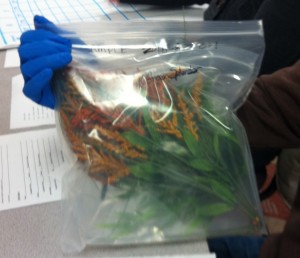Invasion of Exotic Plant Disease: Practicing Our Emergency Response
Chris Brunner, April 8, 2015

Painted plant sample simulating a foreign plant disease being entered into the plant diagnostic lab system.
The Western Institute for Food Safety and Security (WIFSS) partnered with the Pennsylvania Department of Agriculture, to deliver a training workshop and drill activity for the state’s agricultural inspectors and emergency planners. The Pennsylvania Department of Agriculture Bureau of Plant Industry Spring Workshop held March 24 – 27, in Harrisburg, PA, focused on preparing the state for introduction of a foreign plant disease and crafting an effective emergency response using the National Incident Management System (NIMS) model.
The Bureau of Plant Industry (BPI) protects Pennsylvania’s $7.4 billion agricultural industry through its livestock feed, fertilizer, soil amendment, lime, pesticide, plant disease and insect control programs. BPI’s plant and agricultural product inspectors are the front-line troops for controlling or eliminating parasites, fungi, bacteria and viruses that could impact the state’s natural resources and cultivated agricultural products. These highly trained professionals are supported by Pennsylvania’s sophisticated Plant Disease Diagnostic Laboratory.
Following suspicion that a foreign plant disease has been introduced, the state’s emergency response teams would operate under the National Incident Management System (NIMS). NIMS was originally developed to streamline local, state and federal resources during fire and other catastrophic disasters such as hurricanes and earthquakes. The NIMS model works equally well however, coordinating the massive response required following the introduction of a foreign animal or plant disease.
The workshop started by reviewing basic information related to first responder safety, bio-security and best practices for investigation as well as updates on current inspection related programs. In subsequent days Dr. Michael Payne, Dairy Coordinator, and Ms. Tracey Stevens, Deputy Director, Animals in Disasters Project, with WIFSS, provided instruction for the Rural Domestic Preparedness Consortium (RDPC) AWR 151, 153, 154 and 156 courses. The table-top exercises focused on agro-terrorism, principles of detection and diagnosis, application of NIMS during agricultural emergencies and fundamentals of disaster recovery.
The culmination of this preparation was a day-long exercise based on the introduction into Pennsylvania of a fictitious plant pathogen, Ruthayibacter taxicus, based on a devastating real-world bacterial plant disease in Australia. The scenario-based drill included the coordination with the existing State Department of Ag’s Incident Management Team as well as the creation of a mock Emergency Operations Center and Incident Action Plan.
Some 25 BPI plant inspectors and 25 agricultural product inspectors participated in the simulated investigation and trace-back. Following a variety of table-top preparatory briefings, state inspectors were sent throughout Harrisburg to meet with staff acting as farmers and managers of plant distribution points. Maintaining Chain-of-Custody, physical samples were entered into the diagnostic lab system. The entire exercise closed with all hands contributing to a frank evaluation of the drill’s success and challenges and opportunities for response improvement in the future.
The drill was developed and coordinated by the Pennsylvania Department of Agriculture’s Plant Inspection Program under the supervision of Dana Rhodes, State Plant Regulatory Official. Erin Bubb, Regional Division Chief, helped to coordinate participation with the Agronomic Products Inspectors. The drill was made possible in part by a grant from the US Department of the Agriculture Farm Bill 2014 funding under Suggestion 6 for Emergency Response and ICS Training. In addition, training was offered by the Rural Domestic Preparedness Consortium through WIFSS.
WIFSS currently has six Department of Homeland Security certified courses that are offered through the RDPC and aim to train first responders in rural areas of the country for disaster situations that involve or directly affect our food supply system. Read about future courses on the WIFSS Course Schedule.
